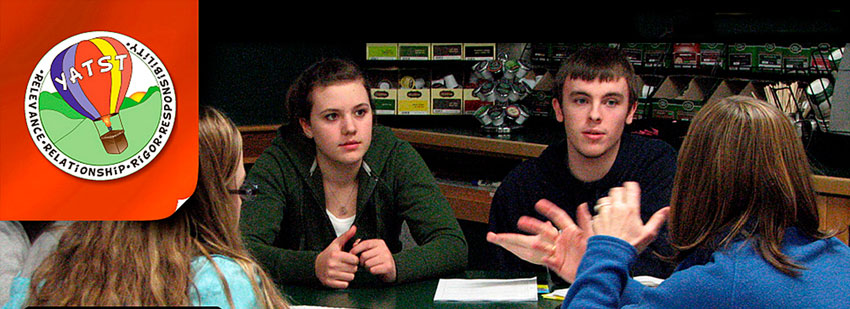 |
Great Expectations . . . or Not?
by Helen Beattie and Barbara Cervone
Students know when a teacher is on their side, when she or he believes they'll amount to something. "I can tell when a teacher is there to support me, when they always ask me questions, when they're acting like they really care," says Michael, a junior at People's Academy in Morrisville, Vermont. Teachers know, too, when they've given a student a boost or, sadly, knocked a student down. "I think sometimes grades can undercut kids," Hazen Union teacher Nicole Foster reflects. "I remember a student who'd spent more time on his essay than the average student, but it still didn't fit that rubric grade, it didn't fit into that box that grades provide for us."
Everyday, the delicate but powerful dance of expectations infuses teaching and learning in classrooms nationwide.
The past school year, Youth and Adults Transforming School Together (YATST) partnered with the Vermont Department of Education and WKCD to examine this dance and create new steps. Adult-student teams in four Vermont schools joined our “Great Expectations…or Not?" initiative with the goal of sparking dialogue within their individual school community on the impact of expectations on student achievement. Together, we shaped and shared strategies that would:
- increase student expectations of their own academic performance, teacher expectations of ALL students’ academic performance, and parent and community expectations for children’s high academic performance
- reframe academic failure or struggle as an essential step in a learning process, rather than an indication of limited learning capacity
- dispel the common myth that intelligence is fixed and predetermined.
Why this work is important
Research affirms that increasing student expectations will have a powerful, positive impact on their future. High or low self-expectations, as measured by children’s estimates of their grades, is one of the strongest known predictors of their ultimate academic success (J.Hattie, 2009). We also know that a young person's self-expectations are heavily influenced by teachers, parents and the school environment (C. Dweck, 2000, 2006). Current brain research highlights the role of self-concept and the power of past experiences in promoting or limiting learning (e.g., D. Sousa, 2006). Expectations will increase when all stakeholders have an opportunity to talk about this issue. YATST believes youth are particularly effective instigators of these discussions.
What we did
Student-teacher teams from the participating schools—Burlington High School, Cabot, Hazen Union, and People's Academy—met several times in full-day work sessions. They learned video interviewing techniques, then used these new skills to record "Great Expectations" interviews with students, teachers, and parents in their own community. They wove the resulting short video clips into powerful discussion prompts. They brainstormed 150 ways that students can build and keep high expectations for themselves, and ways teachers and parents can support them. They explored the differences between "growth" and "fixed" mindsets and figured out how to share these important distinctions with peers, educators, and the community. YATST presented the results at a June institute that brought together over 400 Vermont K-12 teachers.
Most of all, the students and teachers in our Great Expectations initiative became energetic advocates for the extraordinary role expectations play in teaching and learning.
Here we share some of the PDFs and video clips we created as part of our year's work.
Video: Motivating Us to Do Our Best
Video: Factors Shaping Expectations
Helen Beattie, Ed.D., is a school psychologist in Vermont. She founded and directs Youth and Adults Transforming School Together (YATST), a statewide initiative that supporets students as allies in school improvement.



